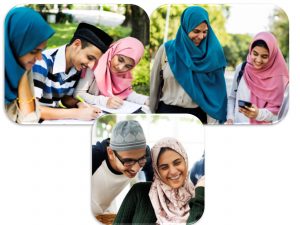Identities of Muslim-American Adolescents, and their Growth and Excellence

The overall aim of this project is to understand Muslim-American adolescents’ and emerging adults (ages 12 to 25 years) identity development and adjustment in the United States using a variety of methods, including focus group interviews, daily experience sampling methods, and surveys across several studies.
We explore the role of different individual (e.g., age, gender, identity, religiosity, gender), interpersonal (e.g., parenting, peers, racial discrimination), and cultural or contextual (e.g., multiculturalism, socio-political context, cultural socialization, Islamophobia) factors, and how they impact Muslim-American adolescents’ development and positive and negative adjustment (e.g., positive youth development, civic engagement, psychological well-being, mental health). A subset of these constructs were also examined in Tunisian Muslim families in Southern Italy.* In our latest data collection effort, we aimed to better understand the experiences of Muslim American emerging adults during the COVID-19 pandemic.
This project is a collaborative effort with community partners providing services to Muslim society.
Research Findings
Heightened hostility toward Muslim Americans during COVID-19 and impacts on their mental health
Civic engagement is important for Muslim adolescents
Follow us on Instagram @umbc_muslimyouthstudy to get our most recent updates!
Collaborators
Alida Lo Coco, Ph.D.
University of Palermo
Madiha Tahseen, Ph.D.
The Family and Youth Institute
Baylor University
Pasquale Musso, Ph.D.
University of Bari